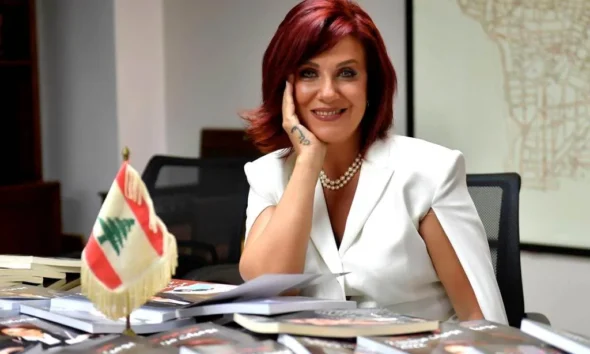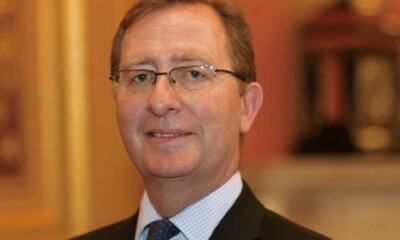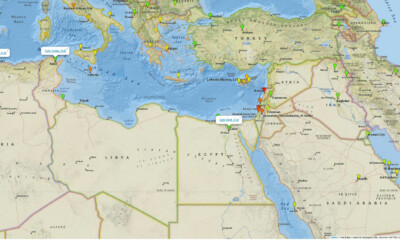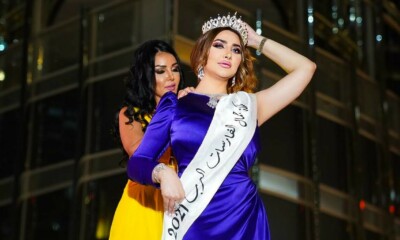Interviews
Kholoud Wattar to Arabisk London: Lebanon is not a renegade state and Lebanese Women can influence policy in society
Published
5 days agoon
By
Huda
Kholoud Wattar to Arabisk London: Lebanon is not a renegade state and Lebanese Women can influence policy in society.
Interviewed by: Mohsen Hassan
In Lebanon’s rich history and variety, a pioneering female figure has emerged, conveying a narrative of hardship and determination that deserves to be shared. Kholoud Wattar Kassem is a politician and human rights activist who stood for the parliamentary elections.
Inspired by an unmatched fervour to safeguard the rights of Lebanese women and serve as a representative for women in a society controlled by prevailing male customs, she commenced her teaching profession in 1995, sowing the seeds of knowledge in the minds of the next generation, convinced that education is the invaluable means of emancipating intelligence and constructing communities.
To further develop her interpersonal, social, and human skills, she subsequently graduated with a degree in social sciences from the American University of Beirut.
The “Mothers of Lebanon” Association, which she created in 2008, worked sincerely to lessen the issue of street children. These initiatives were a protest against poverty and hardship. Moreover, our visitor was eager to help those in need by volunteering and participating in community service, demonstrating her unwavering commitment to humanity.
Kholoud Wattar entered the Lebanese parliamentary elections in 2013 to run for the Sunni seat in Beirut III, however, the election was called off. In 2014, she ran once more, but this time the elections were also called off. In 2018 and 2022, she ran.
She took bold, courageous moves and acted with a strong conviction that women may challenge male domination in the Lebanese and Arab political arena, even in the face of certain challenges and setbacks. With every election, she acquired extensive expertise in navigating the antiquated social customs that prevent women from participating in many spheres of life.
Likewise, she received a warm reception from the Jordanian Parliament Hall as the coordinator of the World Women Parliamentarians Organisation in the Middle East and North Africa, following her selection in 2016 to lead a significant conference supporting female entrepreneurs. Later, in 2017, the Lebanese Parliament invited her back to chair a further conference aimed at improving global efforts to preserve women’s health and tying them in with women’s role in bolstering national economies.
These endeavours reflected her unrelenting devotion to women’s concerns and showcased her exceptional capacity to establish forums for dialogue and exchange between Arab women and the global society.
Wattar’s enthusiasm for women’s labour continued beyond the limits of Lebanon. She works as an international consultant for the Women Leaders of the World Organisation and consistently contributes to the creation of policies that improve the standing of women in society through her organisation, Lebanese Women Towards the Decision-Making Centre.
Besides, Kholoud Wattar gave a thorough understanding of the roles that women may play in politics in her book Women and Politics in Lebanon. She also wrote about her experiences as an election candidate in her books Diaries of a Candidate 1 (2018) and Diaries of a Candidate 2 (2022).
Motivating people to take risks and get involved in politics, advocating for women’s rights and stressing the importance of empowering them in social, economic, and political spheres; believing that women’s determination and perceptive vision will be the catalysts for change.
Amidst her experiences, writings, and endeavours, she has consistently stood out for her innovative capacity to foster familiarity and collaboration with individuals who possess different perspectives and worldviews, regardless of gender. She views kindness and respect for one another as a means of promoting harmony and peaceful coexistence.
Kholoud Wattar was a key player in the search and advocacy for a more just, safe, and stable society because of her profound regard for human and cultural variety and her firm belief in its importance.
She is a one-of-a-kind lady who cherishes Lebanon and its people’s aspirations and thinks that patience and collaboration are the keys to achieving goals and dreams. Furthermore, Arabisk London had an interview with Kholoud Watar Kassem regarding Lebanon’s troubles and future.
First, in light of the present Lebanese scenario, which stations have you Kholoud Wattar reached in your political and partisan interactions?
My political interactions are still attempting to shape national policies, and they have come to a critical juncture, particularly in advocating for women’s leadership and decision-making empowerment in light of Lebanon’s convoluted political landscape. My primary concerns are social justice and human rights.
To raise awareness of the issues facing my nation and try to find solutions by expanding the role of women in politics, especially in light of the political corruption and economic collapse in this country, my association, Lebanese Women Towards the Decision-Making Centre, and I will keep working with Lebanese and international women’s organisations.
You studied human rights principles at the American University of Beirut. Following the events in Gaza, what do you think will happen to American culture in the region from now on?
The future of American culture in the region appears to be facing formidable obstacles; the ongoing events in Gaza, characterised by aggression and unprecedented violations, could have a significant impact on the country’s political and cultural reputation in the region and globally, as American culture is being scrutinised.
This might compel it to re-examine its entire standing and role in the area, particularly concerning its stances on human rights and its involvement in local conflicts. If this isn’t the case, postponing or doing this assessment will make people less supportive of its policies and possibly make them more inclined to adopt different cultures.
How happy is Kholoud Wattar with the results of the current situation in Lebanon? And as a politician from Lebanon, do you have a unique idea for the solution?
I am not happy with the state of affairs in Lebanon; it is very painful. However, I believe that we are in a crisis that calls for drastic changes because the political, social, and economic crises are getting worse and there is a glaring lack of genuine leadership. To put it briefly, my vision for the solution centres on empowering women to participate in political decision-making and developing a more comprehensive and independent political approach that is free from outside influences and sectarian bias.
What, in your opinion, have been the cultural and cognitive shifts brought about by the cumulative crises in Lebanon? And specifically in the minds of Lebanese women?
After a series of increasingly severe crises, Lebanese society has evolved to recognise the need for political change to address the country’s economic and political problems. This is particularly true in cases where political situations have perpetuated the same class of political actors since Lebanon’s formation, only escalating the violence and agony of the crises.
economic and political problems. This is particularly true in cases where political situations have perpetuated the same class of political actors since Lebanon’s formation, only escalating the violence and agony of the crises.
Lebanese women are now demanding a bigger part in social justice and national reconstruction as a result of these crises. Actually, after witnessing the effects of corruption and male dominance on the future of their country, Lebanese women have grown stronger and more determined to assume leadership roles.
Out of all the women who made promises at the Vital Voices Summit, what was your commitment and pledge? What lesson did this international women’s event teach you that you learnt most importantly?
I committed to bolstering women’s leadership, empowering them to take on decision-making roles, and providing support to women in Lebanon and the surrounding region. After attending this summit, I had a greater appreciation for the value of global collaboration and had made many new friends who are influential women who work to improve their nations and share ideas and experiences to make a meaningful difference.
Some books and publications have come out of your experience running for office in Lebanon. What content do they have? Beyond these publications, what else have the experiences yielded?
Yes, I did publish my books, “Diary of a Candidate 1” in 2018 and “Diary of a Candidate 2” in 2022. Both books discussed the difficulties I had running as an independent candidate for the Lebanese elections, including social and political obstacles in a complicated political system that was dominated by men.
Not only have these two books come from my electoral experiences, but I firmly believe that radical reforms to the Lebanese political system are necessary and that women should lead the charge on these reforms.
What about the ideas and lessons Kholoud Wattar hopes to impart to readers about Women and Politics in Lebanon?
This book’s message is focused on unearthing and describing the long-standing customs that have accumulated and constrained many Lebanese people’s affairs, relationships, and lives. As a result, numerous difficulties and roadblocks have been placed in the way of women’s political, social, and economic empowerment in Lebanon.
Lebanese people’s affairs, relationships, and lives. As a result, numerous difficulties and roadblocks have been placed in the way of women’s political, social, and economic empowerment in Lebanon.
Within the framework of all of this, the book also discusses several UN and international charters and covenants that the Lebanese state has ratified, the role played by the clergy in Lebanese society, the positive and negative aspects of women’s political rights in Lebanon, and other information pertaining to women’s political rights in Lebanon.
The book also contains some information from my interviews with senior party officials regarding the nation’s women’s quota system.
What is your assessment of the reconciliation between Saudi Arabia and Iran? With Hezbollah still a major political force in Lebanese affairs, what benefits can Lebanon hope to reap from this reconciliation?
Given that Hezbollah plays a significant role in the regional tensions that negatively impact the Lebanese interior, the Saudi-Iranian rapprochement may present Lebanon with a favourable opportunity if utilised prudently to bring about some form of stability.
Why, in your view, is Lebanon’s diversity—both human and sectarian—becoming more problematic than it once could have been? Is there a religious conflict going on in Lebanon?
Human and sectarian diversity is one of Lebanon’s greatest assets and a fundamental component of its identity, but political leaders’ exploitation of it for their gain has turned it into a crisis.
Nevertheless, religion and sectarianism are being used as a tool to incite sedition; the conflict in Lebanon is more political and economic in nature.
You tattooed your right-hand side with the name Lebanon. What is that symbol’s significance and hidden meaning?
– This tattoo symbolises my strong bond with Lebanon. It is an expression of my belief in the need to fight for a better future for this country and a symbol of my belonging and identity that I will never give up, no matter what.
The harsh economic conditions push young Lebanese people to flee their country and homeland. Could this be the deliberate aim of this nation’s enemies?
Since the youth are the catalyst for change and the nation’s progress, some may aim to undermine Lebanon by pressuring its youth to leave.
Yet, the leadership of Lebanon must also share some blame for failing to create an environment that would have encouraged these young people to stay and continue contributing to the development of the nation. On the one hand, the loss of human resources makes Lebanon less resilient to external shocks.
Some reiterate while others caution that Lebanon is a renegade state. What perspective and sense does Kholoud Wattar apply to this startling statement?
This expression expresses dissatisfaction with the state of affairs in Lebanon, but it is also unfair. Instead of being a true renegade state, Political corruption and external and internal influences on the country’s political structure are major problems in Lebanon. Achieving transparency and democracy within the system requires systemic reform and restructuring.
In the context of the local media, what persistent myths, in your opinion, harm Lebanese women?
Stereotyping Lebanese women based solely on their appearance and repeatedly presenting them as elegant and fashionable is one of the most significant and harmful of these media fallacies. 
In general, this is not a bad thing because Lebanese women are always elegant and beautiful, but focusing on this aspect while ignoring the image of successful Lebanese women in academia, in society and economics, managing large companies, and many other fields has been a serious and ongoing insult to the status of women in Lebanon.
For example, women make up over 50% of the judiciary in Lebanon, a fact that is missing in contrast to the media’s insistence on classifying Lebanese women as only being attractive and elegant.
This, along with ignoring the image of successful Lebanese women in these fields, has been a serious and ongoing insult to the status of women in Lebanon.
Lastly, how does Kholoud Wattar plan to support Lebanon and the Lebanese in the coming phase? How about moving back to Lebanon and making a home there?
My approach is to assist Lebanese women in taking on significant decision-making roles and to work towards creating a global network of support for Lebanon.
Regarding going back, I consider Lebanon to be my original home, even though I did not emigrate. Almost every month, I travel to Lebanon to speak with those in charge of them.
If my address has changed, it’s because my husband, family, and kids have all, regrettably, moved abroad; I had to follow them. However, this does not imply that I have left. I will always and eternally be in Lebanon.
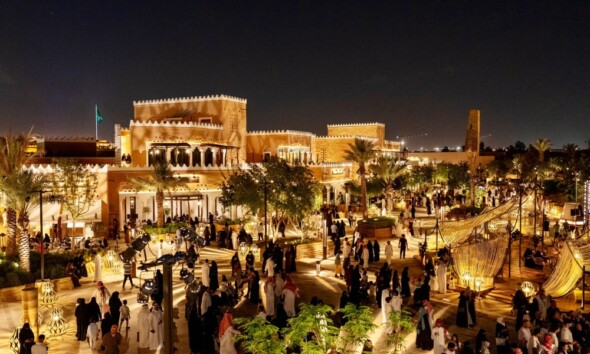
Wadi Safar, a Premium Tourism Site in Diriyah’s Centre
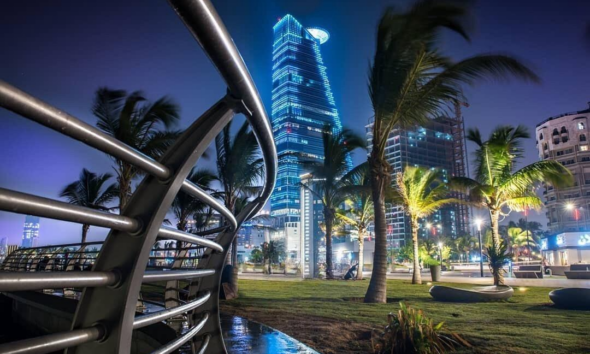
Luxurious Hotels and Resorts in Jeddah

Hyatt Hotels Corporation Unveils Two Luxurious Hotels in Jaumur
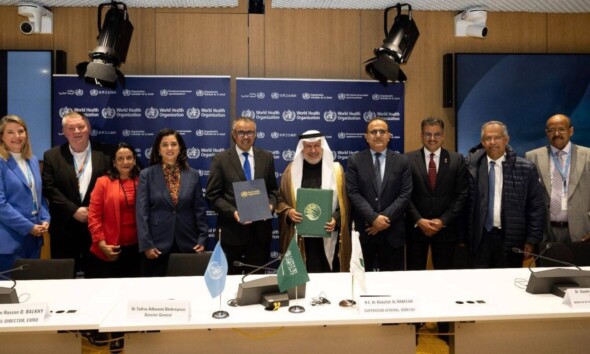
Saudi Humanitarian Aid to Three Nations’ International Organisations, Including Syria
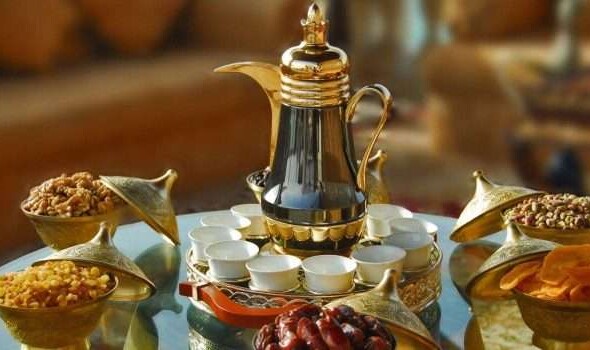
Hospitality Customs in Saudi Arabia Blend History and Modernity
